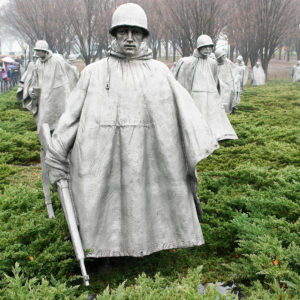Editor’s Note: For another viewpoint, see Point: Veterans Day Is About Much More Than Shopping
“Handshakes from strangers and a free meal at Applebee’s,” I used to tell the young officers. “That’s what you’re entitled to.”
In my short career in the Marine Corps, I started to see a trend — veterans demanded discounts at local retailers, while civilians refused to counter the views of those same vets. All for fear of being labelled unpatriotic or “anti-military.”
There’s an irony here, as the civilian-military divide grows: Veterans are showered with platitudes and ignored by policy.
This Veterans Day, we have a chance to shift those trends.
Our newly elected leaders are obligated to prioritize not just veterans’ affairs, those programs that cater to service members after they take off the uniform, but also to reform our approach to foreign policy.
Veterans Day — or Armistice Day as it is observed in our European partner nations — is a symbol of a foreign policy approach that has been all but suffocated since the holiday’s inception.
Veterans Day was originally a celebration of peace, not war, observing the joyous end to “the war to end all wars.” It was meant to commemorate those who bore the battle so that the United States could “show her sympathy with peace and justice in the councils of the nations.” It was hopeful, looking forward to an international structure that prioritized cooperation over conflict, and alliances over anarchy.
The uncertainty of that promise is baked into the holiday’s very name. An armistice isn’t permanent, but rather a temporary cessation of hostilities. Likewise, peace isn’t passive, because a passive peace cannot endure. We cannot “achieve” peace and then walk away from those who fought at our sides to achieve it. We cannot conflate a war won with a conflict resolved.
Just as the world learned with the onset of World War II, failure to address the root causes of a conflict can lead to a resurgence in violence. The peace achieved on November 11, 1919, wasn’t permanent, and our attempts to bring lasting unity to the European continent would take two and a half more decades of diplomacy, trade and war.
And yet, 75 years later, we’ve seemingly forgotten that costly lesson.
We’ve hyper-militarized our foreign policy, with the Department of Defense replacing the Department of State as our leader in international relations.
Our “national security” budget is bloated, almost obscene in relation to our national debt and the Department of State budget. The U.S. departure from the Paris Climate Accord and the hard-fought Iranian Nuclear Deal signal the abandonment of the pillars of lasting peace — multilateralism, diplomacy, consensus building and economic freedom.
What’s worse, veterans have been some of the most vocal agitators of this hyper masculine, violence-seeking militarization of our foreign policy — and too often our citizenry remains silent. Instead, many people prefer to double up on substandard coffee and “VetBro” t-shirts while doubling down on empty slogans — using faux outrage and star-spangled concern for veterans as reasons to fight against refugees and racial justice.
But it’s not too late. Veterans across the political and socioeconomic landscape are standing up to celebrate the heterogenous diversity of the veterans’ community. Veterans and their advocates are doing real work to both support the service members of yesterday, and to protect the veterans of tomorrow.
Veterans aren’t relegated to the dusty backbars of VFWs and American Legion potlucks anymore. They’re storming the halls of Congress and knocking on the doors of Main Street. Veterans are sharing their experiences and their needs — and we all have an opportunity to listen, re-rig our sails, and set a new course for a foreign policy that serves the entire international community.
Veterans Day was born of a call for peace, not violence.
This Veterans Day I urge us all to honor our women and men in uniform, by matching our enthusiasm for promotional deals with demands for policy changes.

